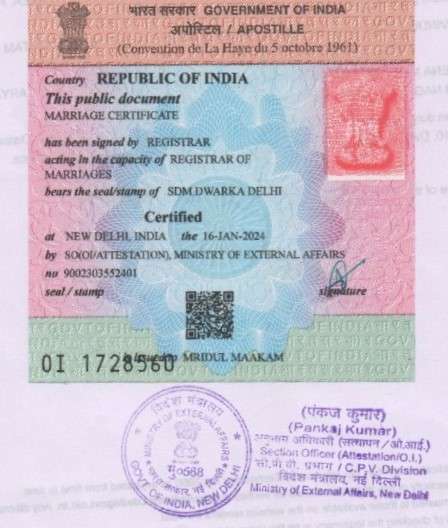Introduction: Apostille in India
In an increasingly interconnected world, the need for authenticating documents for international use has become paramount. Whether it’s for educational purposes, employment opportunities, or legal matters, ensuring the legitimacy of documents is crucial. In India, one of the mechanisms for this authentication is the apostille.

What is an Apostille?
The term “apostille” originates from the French word meaning “certification.” An apostille is a form of authentication or legalization of public documents, ensuring their validity for use in foreign countries. It’s essentially a specialized certificate that is attached to documents by designated authorities.
Why is it Used?
The primary purpose of an apostille is to simplify the process of document verification in countries that are part of the Hague Apostille Convention. By affixing an apostille to a document, it eliminates the need for further legalization or authentication when presenting the document in another member country. Apostille in India, This streamlines international transactions, such as business agreements, academic enrollments, or legal proceedings, saving time and resources for individuals and organizations.
Difference Between Notary and Apostille
While both notarization and apostille serve to authenticate documents, they serve different purposes and have distinct processes:
- Notary: Notarization involves the verification of signatures on documents by a notary public. It confirms the identity of the signatory and ensures that they are signing the document willingly. Notarization is primarily used for domestic purposes within a country’s legal system.
- Apostille: Apostille, on the other hand, is an international certification that validates the authenticity of documents for use abroad. Unlike notarization, which only verifies signatures, apostille verifies the entire document, including seals, stamps, and signatures of public officials.
Validity of Apostille in India
It’s important to note that an apostille is only valid in countries that are parties to the Hague Apostille Convention. As of 2024, there are 113 member countries, including India. Apostille in India. However, if a document needs to be used in a non-member country, alternative methods of legalization may be required, such as consular legalization or embassy certification. Apostille in India
In conclusion, the apostille plays a vital role in facilitating international document transactions by providing a standardized method of authentication. Understanding its purpose, process, and differences from notarization is essential for individuals and organizations engaging in cross-border activities. Apostille in India, By leveraging the apostille, they can navigate the complexities of international document legalization with ease and confidence.Contact us for apostille service in india.
FAQs about Apostille
- What is an apostille and why is it important?
An apostille is a form of authentication or legalization of public documents, crucial for ensuring their validity for international use. It simplifies the process of document verification in countries that are part of the Hague Apostille Convention, saving time and resources for individuals and organizations engaged in cross-border transactions. - How does apostille differ from notarization?
Notarization involves verifying signatures on documents by a notary public for domestic use within a country’s legal system. Apostille in India, on the other hand, is an international certification that validates the entire document for use abroad, including seals, stamps, and signatures of public officials. - Where is an apostille valid?
An apostille is valid in countries that are parties to the Hague Apostille Convention. As of 2024, there are 113 member countries, including Apostille in India. However, for non-member countries, alternative methods of legalization may be necessary, such as consular legalization or embassy certification. - What types of documents can be apostilled?
Generally, public documents such as birth certificates, marriage certificates, educational diplomas, and legal documents can be apostilled. However, the specific requirements may vary depending on the regulations of the issuing country and the receiving country. - How long does it take to get an apostille?
The processing time for obtaining an apostille can vary depending on factors such as the type of document, the issuing authority, and the country’s procedures. It’s advisable to check with the relevant authorities or consult a professional service provider for accurate timelines. - Can any authority issue an apostille?
No, only designated authorities in the issuing country can issue apostilles. These authorities are typically government departments or agencies responsible for maintaining public records and documents. - Do I need to translate my documents before getting an apostille?
In some cases, documents may need to be translated into the official language of the receiving country before obtaining an apostille. Apostille in India, It’s advisable to check the requirements of the receiving country or consult with legal experts for guidance on translation needs. - How long is an apostille valid?
Once issued, an apostille is generally considered valid indefinitely, as long as the document itself remains unchanged. However, specific validity periods may vary depending on the regulations of the receiving country. - Can I apostille a document myself, or do I need professional assistance?
While it’s possible to apostille a document independently, the process can be complex and time-consuming, especially when dealing with international transactions. Many individuals and organizations opt to seek professional assistance from service providers experienced in document authentication to ensure accuracy and efficiency. - What should I do if my document requires legalization for a non-member country of the Hague Apostille Convention?
If a document needs to be used in a non-member country, alternative methods of legalization such as consular legalization or embassy certification may be necessary. It’s recommended to consult with legal experts or embassy officials of the receiving country for guidance on the appropriate legalization process.



Leave a Reply